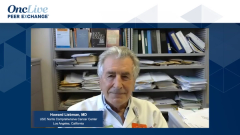
Data on Avatrombopag in Chronic ITP
A commentary on clinical experience with avatrombopag, another oral TPO-RA, in treating ITP.
Episodes in this series

Transcript:
Morey Blinder, MD:Let me turn to that avatrombopag and ask Danny about that and just your thoughts about the data. I know it was originally used for short-term use for surgical thrombocytopenia in surgical settings and to bring the platelet count up short-term and then it expanded to the ITP [immune thrombocytopenia] world. Danny, do you want to talk a little bit about the data for avatrombopag?
Daniel Landau, MD: Yes, absolutely. So, similarly to what you mentioned, I have used avatrombopag across the different indications, and I’ve found in my personal practice and a number of the papers that the success rates reported by trials tend to be similar—that is, in the same realm as what you see with the different products. What I do think is interesting—and Howard, I'm curious what your exposure has been with this—is I think I've had some patients where the responses may have been suboptimal or there were some toxicities with 1 agent. For example, like in eltrombopag. I've switched to the other product and have actually had some success. So, I'm curious if you've seen anything like this as well.
Howard Liebman, MD: We just published data about switching in the British Journal of Haematology. It combined our data with data from Massachusetts General Hospital (Boston), University of Pennsylvania (Philadelphia), and University of Washington (Seattle). I told you the example of our patients, particularly [those] with fatty liver problems, [who] experienced decreased liver enzymes when we dropped the eltrombopag and switched them to avatrombopag. Thus, there's no evidence in my mind from the clinical trials. Now the clinical trial data are weak. There are just some really relatively small numbers compared with eltrombopag, so there's no doubt about that. But [in] the subsequent clinical experience, I think most of us find that it's very effective. The advantage is that it can be taken with food for optimal absorption. I haven't seen any obvious toxicity. I think there's still going to be the same thrombotic risk in the populations that are particularly older that we see with eltrombopag and romiplostim,, and I don't think that disappears. I think that I've had some really difficult cases that were on 75 milligrams of eltrombopag and not responding at all, and when we put them on 40 milligrams of avatrombopag, whether it's due to better bioavailability or better absorption, they were able to get their platelet counts over 3000. I think a lot of us feel that, for some reasons, maybe again, bioavailability, it may be a more potent agent. But you can't make that comparison statement—just that you've seen patients who have not done as well on eltrombopag who have had better response on avatrombopag.
Morey Blinder, MD:Those would be really hard conclusions to make at this point. There's no doubt about that.
Transcript edited for clarity.









































